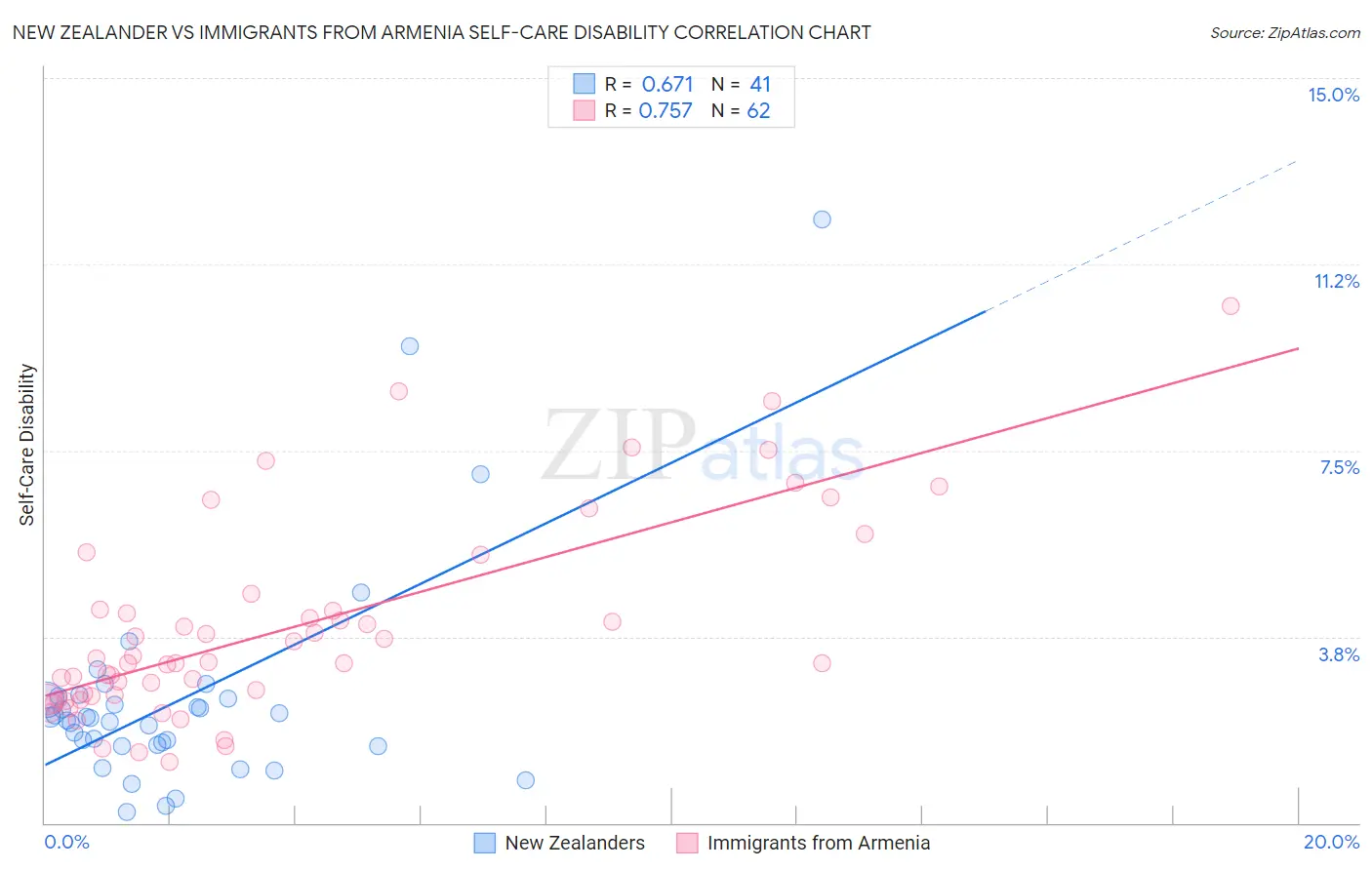New Zealander vs Immigrants from Armenia Self-Care Disability
COMPARE
New Zealander
Immigrants from Armenia
Self-Care Disability
Self-Care Disability Comparison
New Zealanders
Immigrants from Armenia
2.3%
SELF-CARE DISABILITY
99.5/ 100
METRIC RATING
59th/ 347
METRIC RANK
4.2%
SELF-CARE DISABILITY
0.0/ 100
METRIC RATING
347th/ 347
METRIC RANK
New Zealander vs Immigrants from Armenia Self-Care Disability Correlation Chart
The statistical analysis conducted on geographies consisting of 106,879,653 people shows a significant positive correlation between the proportion of New Zealanders and percentage of population with self-care disability in the United States with a correlation coefficient (R) of 0.671 and weighted average of 2.3%. Similarly, the statistical analysis conducted on geographies consisting of 97,700,999 people shows a strong positive correlation between the proportion of Immigrants from Armenia and percentage of population with self-care disability in the United States with a correlation coefficient (R) of 0.757 and weighted average of 4.2%, a difference of 80.9%.

Self-Care Disability Correlation Summary
| Measurement | New Zealander | Immigrants from Armenia |
| Minimum | 0.21% | 1.2% |
| Maximum | 12.2% | 10.4% |
| Range | 11.9% | 9.2% |
| Mean | 2.5% | 3.9% |
| Median | 2.1% | 3.2% |
| Interquartile 25% (IQ1) | 1.6% | 2.6% |
| Interquartile 75% (IQ3) | 2.5% | 4.3% |
| Interquartile Range (IQR) | 0.97% | 1.7% |
| Standard Deviation (Sample) | 2.3% | 2.0% |
| Standard Deviation (Population) | 2.2% | 2.0% |
Similar Demographics by Self-Care Disability
Demographics Similar to New Zealanders by Self-Care Disability
In terms of self-care disability, the demographic groups most similar to New Zealanders are Immigrants from Cameroon (2.3%, a difference of 0.11%), Immigrants from Japan (2.3%, a difference of 0.14%), Immigrants from Belgium (2.3%, a difference of 0.18%), Immigrants from Eastern Asia (2.3%, a difference of 0.19%), and Immigrants from France (2.3%, a difference of 0.23%).
| Demographics | Rating | Rank | Self-Care Disability |
| Immigrants | Serbia | 99.6 /100 | #52 | Exceptional 2.3% |
| Australians | 99.6 /100 | #53 | Exceptional 2.3% |
| Argentineans | 99.6 /100 | #54 | Exceptional 2.3% |
| Immigrants | France | 99.6 /100 | #55 | Exceptional 2.3% |
| Immigrants | Eastern Asia | 99.6 /100 | #56 | Exceptional 2.3% |
| Immigrants | Belgium | 99.6 /100 | #57 | Exceptional 2.3% |
| Immigrants | Cameroon | 99.6 /100 | #58 | Exceptional 2.3% |
| New Zealanders | 99.5 /100 | #59 | Exceptional 2.3% |
| Immigrants | Japan | 99.5 /100 | #60 | Exceptional 2.3% |
| Palestinians | 99.4 /100 | #61 | Exceptional 2.3% |
| Egyptians | 99.4 /100 | #62 | Exceptional 2.3% |
| Mongolians | 99.3 /100 | #63 | Exceptional 2.3% |
| Swedes | 99.3 /100 | #64 | Exceptional 2.3% |
| Brazilians | 99.3 /100 | #65 | Exceptional 2.3% |
| Immigrants | Argentina | 99.3 /100 | #66 | Exceptional 2.3% |
Demographics Similar to Immigrants from Armenia by Self-Care Disability
In terms of self-care disability, the demographic groups most similar to Immigrants from Armenia are Puerto Rican (3.7%, a difference of 13.7%), Armenian (3.4%, a difference of 22.7%), Pueblo (3.3%, a difference of 28.2%), Tohono O'odham (3.1%, a difference of 34.1%), and Colville (3.1%, a difference of 34.2%).
| Demographics | Rating | Rank | Self-Care Disability |
| Dutch West Indians | 0.0 /100 | #333 | Tragic 3.0% |
| Houma | 0.0 /100 | #334 | Tragic 3.0% |
| Immigrants | Azores | 0.0 /100 | #335 | Tragic 3.0% |
| Immigrants | Yemen | 0.0 /100 | #336 | Tragic 3.0% |
| Choctaw | 0.0 /100 | #337 | Tragic 3.0% |
| Cape Verdeans | 0.0 /100 | #338 | Tragic 3.0% |
| Immigrants | Dominican Republic | 0.0 /100 | #339 | Tragic 3.0% |
| Immigrants | Cabo Verde | 0.0 /100 | #340 | Tragic 3.1% |
| Dominicans | 0.0 /100 | #341 | Tragic 3.1% |
| Colville | 0.0 /100 | #342 | Tragic 3.1% |
| Tohono O'odham | 0.0 /100 | #343 | Tragic 3.1% |
| Pueblo | 0.0 /100 | #344 | Tragic 3.3% |
| Armenians | 0.0 /100 | #345 | Tragic 3.4% |
| Puerto Ricans | 0.0 /100 | #346 | Tragic 3.7% |
| Immigrants | Armenia | 0.0 /100 | #347 | Tragic 4.2% |